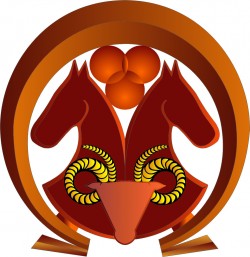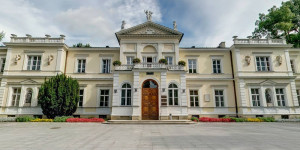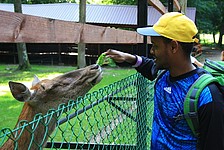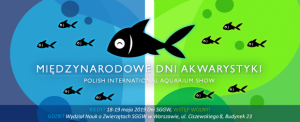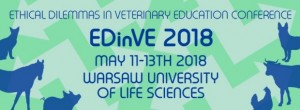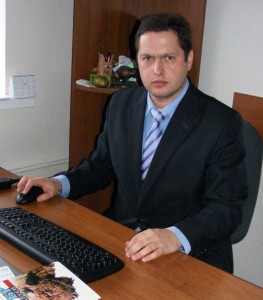 At our Faculty we host a visiting professor Grigor Yanuta from Belarus. Below we present the figure of our Guest:
At our Faculty we host a visiting professor Grigor Yanuta from Belarus. Below we present the figure of our Guest:
Visiting
Date of birth 08 09 1978. Location: Dubno village, Grodnenskaya oblast, Belarus
Education experience
09.1995-06.2000: Grodno State University, Faculty of biology and ecology, speciality “biology“
11.2000-10.2003: PhD study, Institute of zoology, National Academy of Sciences of Belarus
02.2007: taking PhD degree on speciality “zoology“
05.2014: taking docent degree on speciality “general biology“
Research experience
10.2003-02.2005: Junior researcher, Institute of Zoology, National Academy of Sciences of Belarus
02.2005-05.2014: Researcher, Institute of Zoology, National Academy of Sciences of Belarus (since 2008 – The Scientific and Practical Center for Bioresourses of the National Academy of Sciences of Belarus)
05.2014-04.2015 Senior researcher, The Scientific and Practical Center for Bioresourses of the National Academy of Sciences of Belarus
04.2015-05.2017 Head of laboratory Teriology, The Scientific and Practical Center for Bioresourses of the National Academy of Sciences of Belarus
06.2017 Leading researcher, The Scientific and Practical Center for Bioresourses of the National Academy of Sciences of Belarus
Participation in the projects:
Projects funded by Belarus National Academy of Sciences and the Ministry of Natural Resources and Environmental Protection of the Republic :
“The development and the implementation of method of the creating of sustainable and geographically conservative populations of elk, red deer, roe deer and wild boar through the biotechnical measures, control distribution and abundance of wildlife species and the promotion of unwanted immigration settling at hunting grounds” (2006-2011)
“The development of the management plan of the population of American mink as malicious alien species in aquatic ecosystems of river basins on the territory of Belarus” (2007-2010)
“The Influence of the pond-forming beaver activity on the distribution and the age composition of juvenile anadromous salmonids in the watercourses of Belarus” (2010-2012),
“To study the ecological and biological characteristics and the adaptations of the beaver (Castor fiber L.) in the anthropogenic landscapes of the Pripyat Polesie (2010-2012)
“The study of the factors and the mechanisms that determine productivity and growth rate of eight modern micropopulations of European bison in Belarus, the definition of an optimal level of their numbers” (2011-2013)
“The development of the management plan of the European bison belarusian population“ (2014)
International Projects:
“Clima-East: the conservation and the sustainable management of the peatlands in Belarus for the reducing carbon emissions and adaptation of wetland ecosystems to climate change” (2015)
“Management of transboundary protected areas of the Alytus County and the Grodno region and its integration into the Pan-European Ecological Network” (LLB-2-175) (2017 г.)
“The integration of biodiversity into the policy and practice of spatial planning in Belarus” (2013)
Publications
Monographs:
Yanuta, G.G. The river beaver in the watercourses of Belarus: changing the watercourses ecological capacity influenced by the beaver construction activity / G.G. Yanuta. – LAP LAMBERT Academic Publishing, 2013. – 140 p.
Sidorovich, V Naliboki Forest Vol. 1-3. Vol 2(wild animals:5.2) Minsk:Chatyry chverci 2016 1222s
Papers:
Yanuta G.G. Winter diet of the river beaver (Castor fiber) in the drainage systems of Pripyat Polesie // Youth in Science – 2012 adj. to the Journal. „Proceedings of the National Academy of Sciences of Belarus” in 5 v. Vol.4. Series of biological sciences: I.D. Volotovsky (chief ed.), V.I. Parfenov [et al.]; Editorial Board. Medical Science Series: A.G. Mrochek (chief ed.), I.V. Zalutsky [et al.] – Minsk Belarus. navuka, 2013. – P.78-81.
Kozlo P., G. Yanuta, P. Velihurau, A.Kazarez. Ecological characteristics of habitats and state of “Beresinsko-borisovskaya” and “Volozhynskaya” European bison population // European bison conservation newsletter Vol. 6 (2013) Żubr i jego ochrona. – Warszawa, 2013. – P. 37-47.
Yanuta G.G., Baltserak M., Zhuk E.Yu. Condition of basin populations of the river beaver (Castor fiber) at the territory of Belarus // Ecological Bulletin. – 2014. – №3 (29). – P.88-92.
Yanuta G.G. The current structure of the beaver population in Belarus. State of the Environment in Belarus: The annual environmental bulletin 2014 / V.F. Loginov [et al.]; ed. V.F. Loginova. – Mn.2015. – Ch.8.
Apollonio M, Belkin VV, Borkowski J, Borodin OI, Borowik T, Cagnacci F, Danilkin AA, Danilov PI, Faybich A, Ferretti F, Gaillard JM, Hayward M, Heshtaut P, Heurich M, Hur-ynovich A, Kashtalyan A, Kerley GIH, Kjellander P, Kowalczyk R, Kozorez A, Matvey-tchuk S, Milner JM, Mysterud A, Ozolinš J, Panchenko DV, Peters W, Podgórski T, Pokorny B, Rolandsen ChM, Ruusila V, Schmidt K, Sipko TP, Veeroja R, Velihurau P, Yanuta G. 2017. Challenges and science-based implications for modern management and conservation of European ungulate populations. Mammal Research 62: 209-217. (IF=1.068)
Areas of scientific interest: Population ecology of animals
 The CASEE Board invites all potential project leaders of initiatives in education, research and capacity building that include a minimum of 3 CASEE members (of different countries) to submit proposals for new initiatives in line with the overall network objectives and stipulated areas of cooperation.
The CASEE Board invites all potential project leaders of initiatives in education, research and capacity building that include a minimum of 3 CASEE members (of different countries) to submit proposals for new initiatives in line with the overall network objectives and stipulated areas of cooperation.









